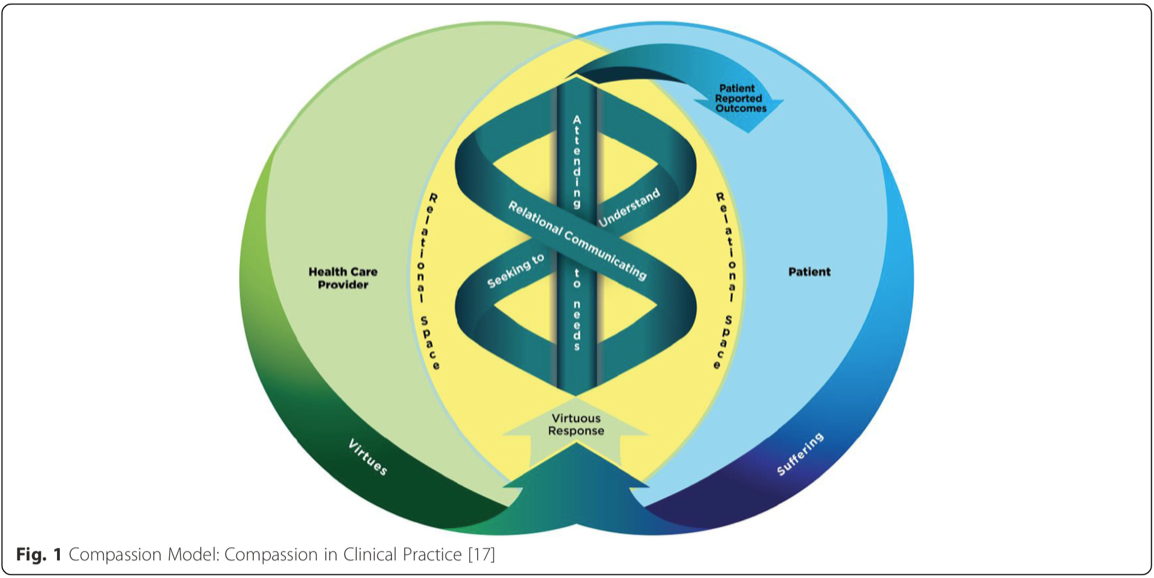What is Compassionate Care in Nursing?
According to a systematic literature review in 2016 published by the National Center for Biotechnology,
“Compassion originates as an empathic response to suffering, as a rational process which pursues patients’ wellbeing, through specific, ethical actions directed at finding a solution to their suffering. We therefore define the term compassion to mean the sensitivity shown in order to understand another person’s suffering, combined with a willingness to help and to promote the wellbeing of that person, in order to find a solution to their situation.”
Compassion in healthcare is an indispensable part of nursing and patient outcomes. It provides patients with emotional support and the confidence they need to fight disease, prepare for recovery, or enter into a serious medical procedure. To achieve the highest level of success, nurses must feel compelled to exhibit compassion towards patients; its absence can lead to patients feeling devalued and emotionally precarious.
Why is Compassionate Care in Nursing Important to Patient Outcomes?
Research published by the U.S. National Institutes of Health’s National Library of Medicine (NIH/NLM) states that, “The delivery of high quality compassionate care is also a significant patient reported outcome, which positively affects a patient’s perception of care and quality of life, while mitigating against patient complaints and malpractice suits.”
Complete patient care goes beyond caring for the patient’s physical problems. Patients may experience additional stress related to their financial situation, familial relationships, and even their physical environment. It is paramount for nurses to treat not only the illness or injury, but also to effectively address the patient’s emotional state. Nurses that are empathetic toward their patients have proven to decrease rates of depression and stress, in turn strengthening their will to live — which can have major impacts on a patient’s recovery time and satisfaction.
As stated in the Journal for Compassionate Health Care, “There is extraordinary potential for blending the best of evidence-based medicine with real patient centeredness, performing medicine with patients rather than doing it to them, to the benefit of all.”
Showing compassion in healthcare can make a world of difference in someone’s day. Being mindful of others allows you to be a driver of change by acting with intention and compassion. Nurses have the opportunity to focus on empathy, ensuring that the patient feels valued, respected, and comfortable with their care. Empathetic and compassionate care in nursing are closely associated with greater patient satisfaction.
How Can a Nurse Demonstrate Compassionate Care?
Even the smallest of responses can convey compassion — greeting patients with a smile or simply making eye contact. Each positive gesture further solidifies the commitment to providing patient-centered quality care aimed at improving patient outcomes.
Leo Buscaglia observed, “Too often we underestimate the power of a touch, a smile, a kind word, a listening ear, an honest compliment, or the smallest act of caring, all of which have the potential to turn a life around.” From sharing real-life anecdotes with patients to respecting patients’ choices, there are a multitude of ways to be sensitive to patient needs and show compassion. Even being there to listen to a patient’s anxieties can drastically improve their overall mental state.
This clinical model of compassion from BMC Medical Education illustrates the health care provider’s role in relation to patient care and compassion.
5 Essential Skills for Delivering Compassionate Care in Nursing
- Emotional intelligence. Strive for high emotional intelligence to handle interpersonal relationships with coworkers and patients. Being able to more keenly perceive and manage emotions improves a nurse’s ability to communicate more effectively in situations from day-to-day tasks to conflict resolution. Awareness and mastery of your emotions and others’ emotions will help you provide compassionate care.
- Resilience. Maintain personal resilience through participation in reflective activities to explore personal values and others’ perspectives. An article published by the American Journal of Critical Care shows that participating in these types of self-exploration activities can improve a nurse’s resilience which is “associated with increased hope and reduced stress.” With increased resilience and reduced stress, nurses are ready to provide quality and compassionate patient care.
- Critical thinking. Demonstrate the ability to think critically and solve problems quickly to achieve high-yielding results in patient satisfaction and care. Nurses who can find solutions deliver compassionate care effectively to patients and families.
- Cultural awareness. Maintain cultural awareness as it relates to patient-centered care. Culture can influence a patient’s view of treatment, overall health, and death. Knowing the patient well enough to determine their cultural view can augment the nurse-patient relationship in a positive way.
- Confidence. A nurse with the ability to communicate any instances of abatement in quality of patient care is critical to fostering the culture of the caring environment within the healthcare organization. Nurses must be able to discuss issues and indicate a clear vision of how compassionate organizations should function with both peers and leaders.
Examples of Compassionate Care in Nursing
Compassionate care in nursing isn’t a difficult thing to practice. In fact, many nurses do it subconsciously already. But being able to recognize its importance and the skills that are required to nurture that compassion allows healthcare organizations to train their workforce more effectively to drive positive patient outcomes and satisfaction.
Here are just a few examples of how to practice compassion in nursing:
Think Before You Speak
Be present and mindful of what your patient is saying to you. If they seem concerned, scared, or anxious, recognize it. Before responding to their concerns, think to yourself “if I were in this patient’s shoes, what information would I want to hear? Is talking about xyz going to stress them out more?”
Keep in mind that this also goes for their families. Treat them with respect, listen to them, and respond in an empathetic way that quells anxieties, if possible, but still delivers factual and crucial information.
Show Interest in the Patient’s Life
Ask them about their job, their hobbies, etc. People tend to love talking about themselves, so if a patient is experiencing anxiety, divert the conversation to something that they personally care about; and show genuine interest in it. This not only puts their minds at ease, it helps build a successful patient-nurse relationship.
Don’t Invalidate Their Feelings
Nurses and healthcare workers see injury and illness all day, every day. It becomes mundane. But to the patient experiencing it, this could not be further from the truth. Understand that to them, their current situation is frightening and the future looks uncertain. Use phrases that validate their feelings such as “I understand” when they express anxiety or even if they lash out. Even a simple offer to hear them out or talk things through goes a long way in expressing empathy and improving their mental state.
Patience is a Virtue
It’s easy to get frustrated when juggling patients or having a chaotic workday. When nurses feel stressed, it becomes easy to rush through the routine care and leads to poor communication. Having even the slightest tone of sarcasm, irritation, or hostility in your voice when interacting with a patient will have noticeable effects on a patient’s trust in their caregivers.
Advocating for Compassionate Care in Nursing and Healthcare
Kirby Bates’ goal is to support our partners in building exceptional healthcare leadership teams: Teams that take the lead in ensuring safe, high-quality patient care and are committed to positive patient and family experiences. As successful healthcare executives, we know firsthand the challenges facing healthcare leadership today and have a proven track record. With 30 years of exceptional leadership solutions: Healthcare Executive Search, Interim Leadership, Coaching, and Consulting Practice, we provide sustainable outcomes and maximum return on investment.
For more information or additional questions, contact the Kirby Bates Associates team of experts today.



